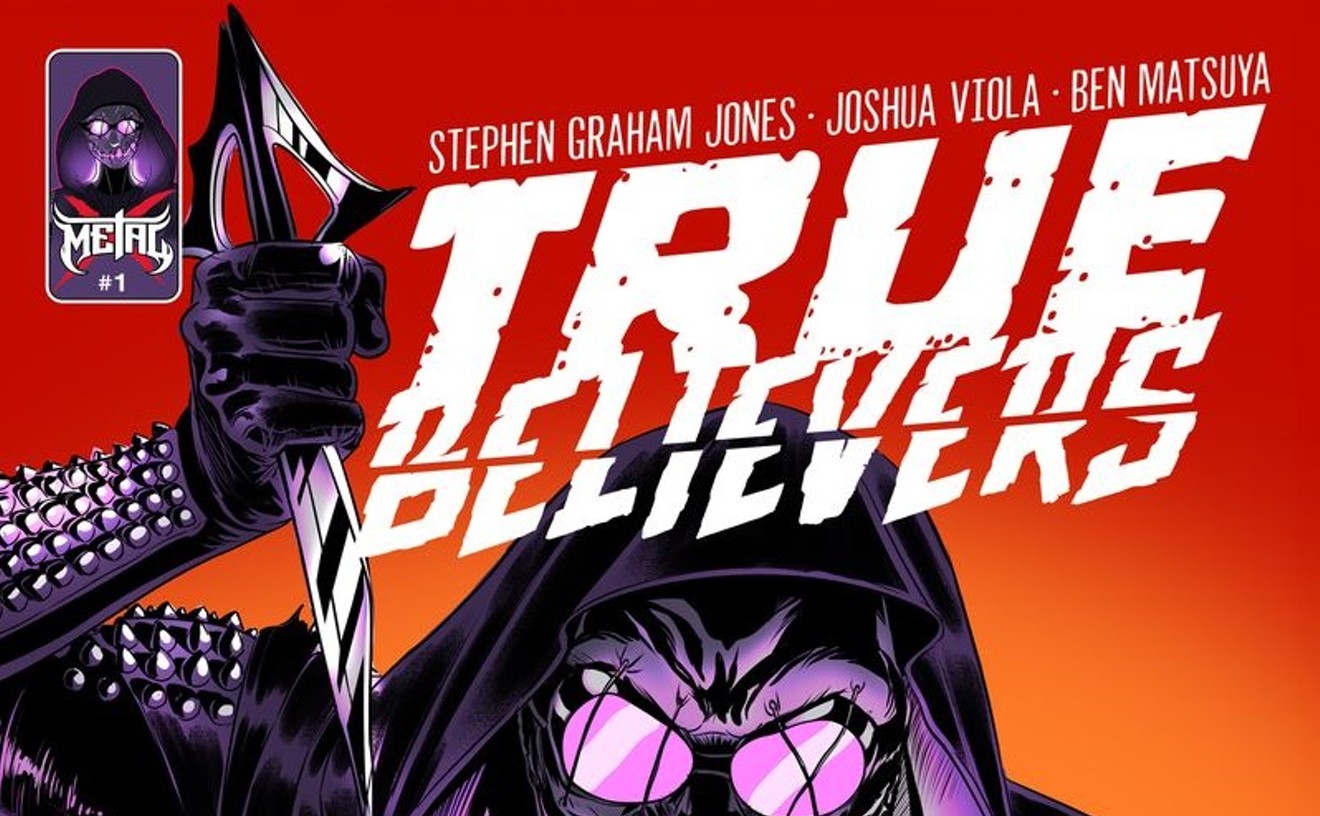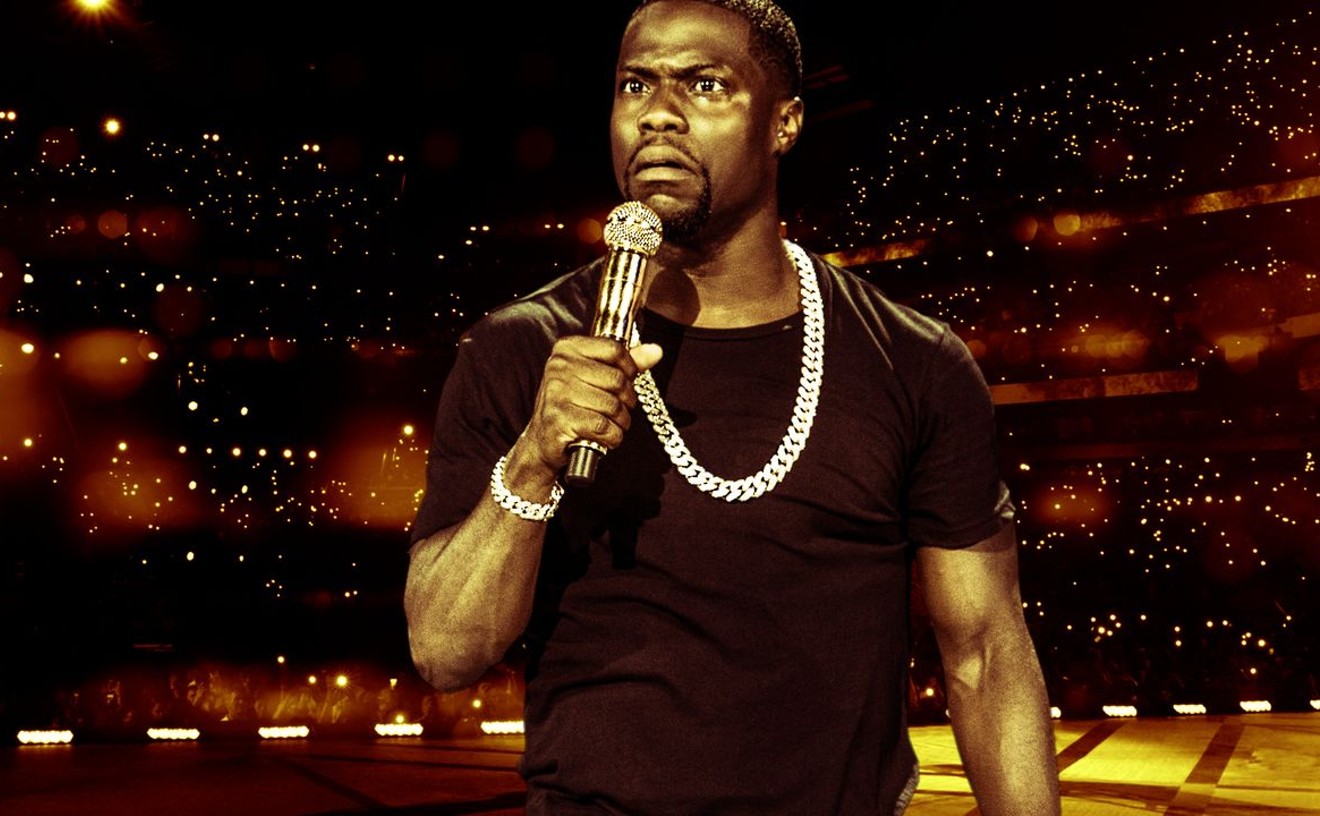In anticipation of his upcoming five-show run at Comedy Works beginning May 2, we caught up with the surprisingly well-dressed Hardwick to get into an ultra-dweeby meta-debate about just who has the right to call themselves a nerd -- while occasionally digressing into topics like hipsters, post-music MTV and the moment Dennis Miller stopped being funny and suddenly became an asshole.
See also: - Obama talks getting stoned and Conan rips GOP at D.C. Correspondents' Dinner - Anthony Jeselnik celebrates baby-death, bulimia and domestic violence at DU - The ten best comedy events in May
Westword: You went to Regis High School in Denver as a kid. Were you into comedy back then? Was there anything going on in Denver in the late '80s?
Chris Hardwick: Well, I've always been into comedy, but I wasn't performing then. I just consumed every piece of comedy I could find -- comedy albums, HBO specials, things like that. I had stacks of VHS tapes. As a teenager, I was too young to get into comedy shows. I'm not even sure what was around in Denver back then.
It's interesting to think of a teenage "comedy nerd." Typically what we think of as nerds at that age are people who are into sci-fi and computers. Was there a scene of social outcasts who were into comedy?
No, I was pretty much it. Nobody I knew was into comedy like that. This was before the Internet, so I wasn't able to find people on a forum or social network. Regis was a small school; there couldn't have been more than a couple hundred people there. There were kids who were into odd things, but not comedy the way I was.
After leaving Denver, you eventually landed a spot hosting Singled Out on MTV. It's a cliche thing to complain about today, but wasn't that the time that people first began whining about music videos being replaced with shows like yours?
Yeah, they've been saying that since about 1988. That's when MTV realized that shortening people's attentions spans began to work against them. People weren't watching video shows anymore, so they started putting on shows like Remote Control and The Young Ones and began programming like a network.
People have been complaining about that forever, and they seem to complain about it even more now. But when you think about the videos they were playing back then, it was the same twelve videos over and over. If you look at shows like 120 Minutes or Headbangers Ball, they really only played a handful of videos.
After you left MTV, you eventually decided to quit drinking, got your life together, and became a successful comic. It seems there are a lot of stories like that in comedy -- Russell Brand, Marc Maron, Ben Roy -- but in rock, it's usually the opposite. Sobriety and happiness in a musician typically lead to shitty music and irrelevance.
I don't know if that's true; I think that's a myth. Maybe it's the case for some people. First of all, people can still have conflict even if they don't drink. I'm sure if we did the math, people getting sober was good for them. You can't focus if you're drinking all the time. It takes focus to succeed at something; there's a certain economy of energy that you have. If you're prone to do things to the extreme, then you can either focus on drinking all the time or you can focus on work.
Maybe there are people who are lucky enough -- or perhaps unlucky enough -- to have people to do things for them, so they can continue that lifestyle of drinking every morning and night. But I'd say in general, I would disagree. I used to think that when I quit drinking I wouldn't be creative anymore, but that wasn't the case. I wouldn't be able to think clearly.
I'm not saying you need to be fucked up in order to make great art, but I think sobriety lends itself to comedy in a way that it doesn't for music. Comedy requires focused thinking, as does music, but music is inherently less cerebral and therefore can be done easier with an absence of mind.
Maybe. I don't know. That's a strong statement. I don't know the answer, but I would like to see data to support either side. I've heard people say that before. I'm sure it's somewhere on the Internet. I think the results could be surprising.
It takes a lot of hunger to get up in front of people and try to make them laugh, and I think as some comics and musicians start to get older, they get less hungry and become comfortable.
Continue reading for more from Hardwick.
Getting back to MTV for a moment, you made an offhand comment on your podcast recently about meeting Denis Miller when he was hosting the VMAs in '97, and said that he was a bit of an asshole to you. It's fascinating to me that there's kind of a generational split on Miller, with older comics citing him as a big influence and younger comics knowing him as that irrelevant conservative from Fox News.
I was a huge fan of Dennis Miller, and that was one of the reasons I was so bummed out about meeting him. His second comedy special was called Black and White, and it was one of my favorite comedy specials of all time. I probably watched that in college about fifty times. He was a phenomenal comedian. He was selling stuff to mainstream America that was pretty incredible. There was some silliness, and some serious stuff and a lot of obscure references.
But then in his third special, he became all about the weird references, and he became really preachy. Politically preachy and sociopolitically preachy. He had this whole bit against Spike Lee. It felt so angry, instead of a comic riffing. He was kind of a dick. He hosted a young-comedian special in the late '80s, one of the Dangerfield specials, and he was pretty shitty toward these young comics that he was introducing. He was like "Yeah, here's a young comic; I've never seen him but they told me he was funny." That is a horrible thing to do if you're hosting a show with these nervous comics, and it puts the audience in a weird frame of mind.
The political stuff hasn't done him very much good with young comedy fans. I don't think it's possible to appear on The O'Reilly Factor each week and still be considered a smart, cool comedian.
Yeah, and he doesn't do standup anymore. He had the standup career, and then the HBO show -- which was good -- and then he just sort of...I don't know what happened. He went further down whatever that hole was. I don't know him outside the 1997 Video Music Awards. After 9/11, his politics shifted.
I like to remember him as -- not that he's dead -- the guy who did Live From Washington, and the Black and White special. Because those were done in the '80s comedy boom, where people were trying to make you laugh at any cost, and they weren't saying anything. So then you had people like Bill Hicks, Dana Gould and Dennis Miller, who were really making statements with their comedy. It was refreshing.
Whether you like it or not, you've become the spokesman for nerd identification in the 21st century. And I'm wondering how that's defined today: If it's being an outcast for your passion, then doesn't the rise in popularity and acceptance of being a nerd cancel out its original meaning?
I don't think you have to be an outcast; that's incidental. I can't say that I have the ultimate definition of what a "nerd" is. A lot of people may disagree, but the one quality that I've noticed is ubiquitous in nerd culture is people who unnaturally obsess over a thing, try and understand its true nature as much as possible, more than other people who are into it. I don't think that it means they have to be an outcast, but I think that it lends itself to being on the fringe, outside the bubble.
Continue reading for more from Hardwick.
You have a popular bit about a designation you call "hipster nerds." And it seems to me that today the term "hipster" is becoming as nebulous as "nerd." They're both difficult to pin down, since no one identifies as the former and too many identify as the latter.
I guess that's true. Patton Oswalt had a great definition for hipster, something along the lines of "a hipster is a nerd without the smarts." Or something like that. Hipsterism is an aesthetic subculture. People look down on it because they see it as an empty fashion culture. If you were to strip it away, it'd be no different than the Kardashians.
But there's an overlap with the nerd concept in that, say, if you're really into the band Belle & Sebastian, those are songs about outcasts, and people are made fun of for liking that band. And yet if you're a hipster who likes music, they're you're band.
I think it's not so much what you like, but how you like it. With nerds, they like something incredibly passionately. And for hipsters -- and I don't think all people who like Belle & Sebastian are like this -- they tend to like things ironically, as opposed to just liking things. "I'm gonna like this thing because it's dumb; look how ridiculous it is that I like this thing."
Well it was your generation that created that whole thing: '90s irony.
[Laughs]. I'm '80s, I'm not '90s. My generation didn't understand irony.
Well you're part of that '90s iconography.
I guess that's true. We didn't understand irony in the '80s, and in the '90s we started to look for it too much. The real strong ironic movement didn't come until the 2000s. It started in the mid-'90s with the grunge dissatisfaction.
Do people often accuse you of not being a true nerd, since you're so stylish and good-looking?
I always feel a slight sting if someone says to me, "You don't look like a nerd." Because it's always how I've identified myself, and this might be an offensive comparison -- it's like if someone was Jewish and then heard "You don't look Jewish." It's like, what is that person supposed to look like? It's someone who doesn't know you, telling you who you are.
You're fond of quoting the High Fidelity line "It's what you like, not what you are like." Do you think you can really tell something about who a person is inside based solely on cultural evidence?
Yeah, because the things you like are what you identify with. They're the things you attach your personality and your identity to.
But you're attaching your personality to those things, as opposed to those things being the crux of your personality.
I suppose. It would be foolish to say, "You like this band, so this is the kind of person you are." I think you have to look at a bunch of things and create a chart based on movies, authors, comedians, etc. I find that on the podcast, we learn the most about who a person is based on what they like.
Chris Hardwick will be performing five shows at Comedy Works from May 2-4. Tickets are $25. For more information, visit Comedy Works' website.
For more comedy commentary, follow me on Twitter at @JosiahMHesse.
Follow @WestwordCulture










